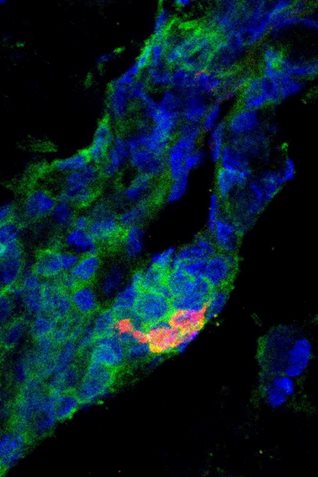Society-Supported Researchers Show How Gut Bacteria May Help Regulate Immune Attacks in MS
November 20, 2020
 IgA B cells (pink) within MS brain lesion
IgA B cells (pink) within MS brain lesion
Furthering our understanding of how people’s gut bacteria (microbiome) may exert influence on multiple sclerosis disease activity, an international group of researchers report that immune cells reactive to specific gut bacteria travel from the gut to the brain during MS relapses, where they may play a protective role by reducing inflammation. This raises the possibility that, with more research, this phenomenon might be harnessed as a potential therapeutic strategy to stop MS.
- Each of us has millions of “commensal” bacteria and other microorganisms living within our intestines. Most of these are harmless and some appear to play a critical role in our normal physiology, such as in establishing and maintaining immune balance by the molecules they release.
- In a series of studies, this international team looked at samples of blood, spinal fluid, and stool from people with MS, people with other disorders, and people without the disease. They also examined brain tissue from people who had MS in their lifetimes.
- Their key results showed that specific immune “B” cells – called IgA B cells – targeted specific strains of bacteria within the gut that have been linked to inflammation in MS. The researchers then discovered that during MS relapses, but not during remissions, those B cells traveled through the blood to MS brain lesions and released messenger chemicals aimed at reducing inflammation (magenta cluster in photo, courtesy of the authors).
- First author Dr. Anne-Katrin Pröbstel (University of Basel) explained that it is still not clear what activates these IgA B cells to become protective and migrate to the brain. “If we find the trigger for that, we could use it to treat MS,” she said.
- This study was funded in part by four National MS Society research fellowships and early career awards to several investigators, including Dr. Pröbstel’s Kathleen C. Moore Fellowship.
“Gut microbiota-specific IgA+ B cells traffic to the 1 CNS in active multiple sclerosis” by Anne-Katrin Pröbstel, MD (University of Basel), Sergio E. Baranzini, PhD (University of California, San Francisco) and others was published early online on November 20, 2020 in
Science Immunology.
Multiple sclerosis is an unpredictable disease of the central nervous system. Currently there is no cure. Symptoms vary from person to person and may include disabling fatigue, mobility challenges, cognitive changes, and vision issues. An estimated 1 million people live with MS in the United States. Early diagnosis and treatment are critical to minimize disability. Significant progress is being made to achieve a world free of MS.
The National MS Society, founded in 1946, is the global leader of a growing movement dedicated to creating a world free of MS. The Society funds cutting-edge research for a cure, drives change through advocacy and provides programs and services to help people affected by MS live their best lives. Connect to learn more and get involved: nationalMSsociety.org, Facebook, X, formerly known as Twitter, Instagram, YouTube or 1-800-344-4867.